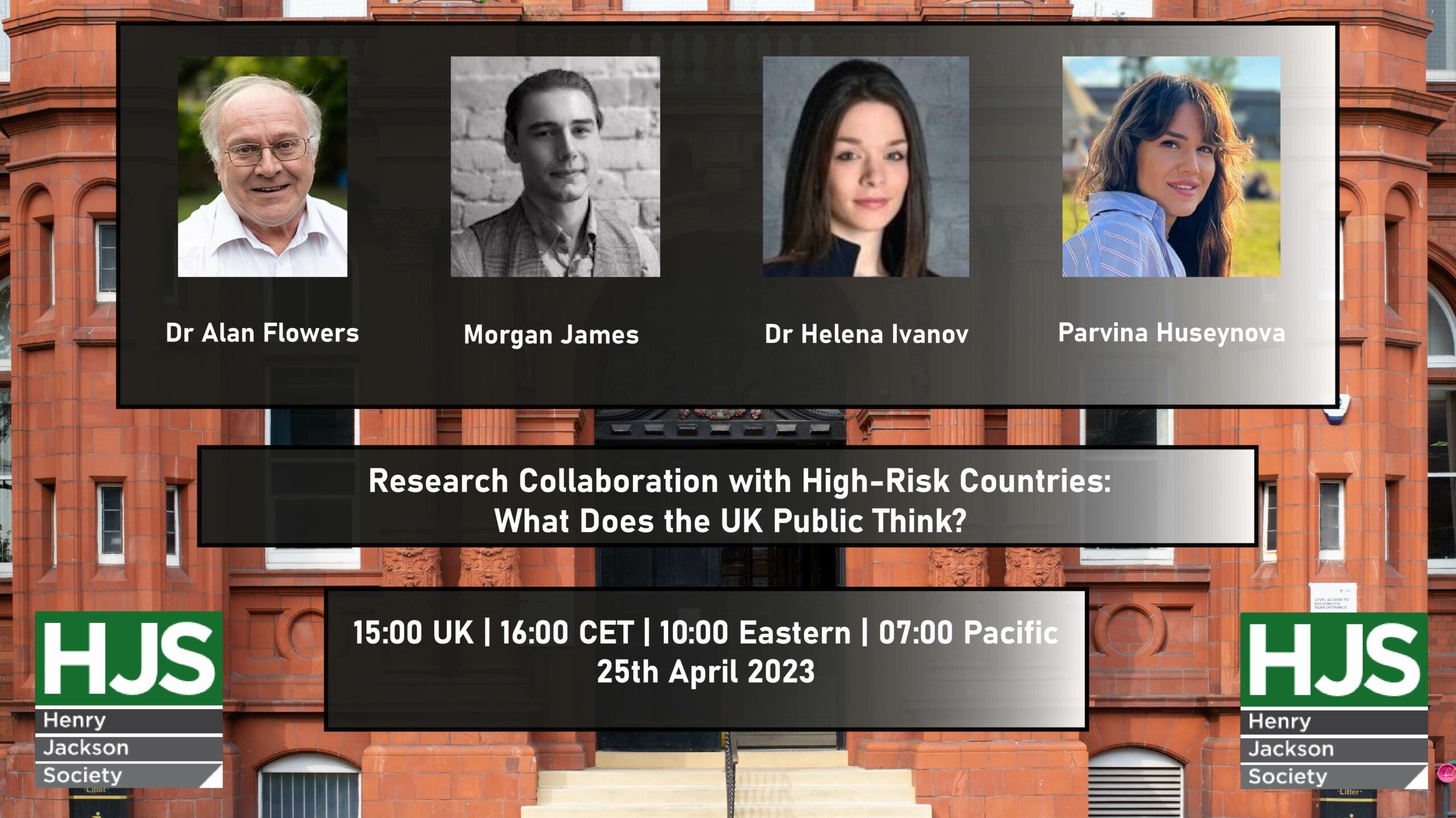Research Collaboration with High-Risk Countries: What Does the UK Public Think?

- This event has passed.
Research Collaboration with High-Risk Countries: What Does the UK Public Think?
25th April 2023 @ 3:00 pm - 4:00 pm

The UK has long been known as one of the global centres for education and academic research, and it continues to attract some of the best academics from across the world. As it stands, “more than half of UK research is a product of international partnerships” and “a fifth of the world’s scientific papers are produced through international collaboration”. These collaborations have brought many immeasurable benefits – including the UK becoming one of the leading academic hubs and the financial gains from international students, staff and funding. However, such collaborations do not come without risks, the severity of which depends on the research area and the institution with which the UK collaborates. For example, the risks can become substantial in instances which involve working with institutions based in high-risk countries whose interests stand in contrast with those of the UK. Thus, in our latest report, we asked the British public whether and to what extent they welcome research collaborations with high-risk countries and what (if any) restrictions should be implemented to protect the integrity of the research that results from such collaborations.
The Henry Jackson Society and Freshwater Strategy are pleased to gather a panel of world experts to present the report and discuss its findings.

Dr Alan Flowers is a British academic nuclear physicist with over 30 years’ experience engaged in academic, cultural and political activity in Belarus and Ukraine. He retired in 2017, after 32 years at Kingston University, but since then has continued his academic engagement with Belarus and Ukraine as an Honorary Academic. His research interests into the consequences of the Chernobyl radioactive fallout in Belarus led to him being invited to Belarus in 1992 to facilitate the development of the newly founded International Sakharov College of Radioecology (ISCR) in Minsk, Belarus.
Between 1992 and 2004 Dr Flowers participated in and coordinated four British Council managed Know-how Fund (KHF) and Regional Academic Partnership (REAP) projects with ISCR and the Belarus State University. During this period, he led research projects into the ecological consequences of Chernobyl fallout in south-east Belarus. Between 1993 and 1997 he established and coordinated parts of an EU funded TEMPUS project in Belarus.
In 1998 Dr Flowers established Belarus youth engagement in the pan-European pluralist democracy educational NGO “European Youth Parliament”. He facilitated this as the Belarus youths’ teacher/coordinator for 17 years, until 2015, primarily with the support of UK and German governmental funding.
Since 2005 Dr Flowers’ academic research and projects coordination has focussed on Ukraine, while he continued cultural and political activity with Belarus although no longer permitted to visit that country. Between 2006-2009 he supervised an INTAS funded Ukrainian PhD student, and between 2015-2022 he won and coordinated five ERASMUS mobility grants for UK-Ukraine academic mobility which led to him coordinating the largest UK-Ukraine Erasmus staff and student mobility funded project in the period 2019-2021. Between 2015 to 2022 Dr Flowers coordinated a British Council partnership project with a Ukraine University and two British Council Creative Spark enterprise start-up development projects with two Ukraine Universities.
Dr Flowers is currently the Chair of the Anglo-Belarusian Society.

Dr Helena Ivanov is an associate research fellow at the Henry Jackson Society. She recently completed a PhD in International Relations at the London School of Economics and Political Science. Her research focuses on the relationship between propaganda and violence against civilians. In her thesis, Helena examined the role propaganda played during the Yugoslav Wars and produced a model for studying propaganda which details the key phases, functions, discourses, and techniques of propaganda (the model itself is applicable to other contexts). Additionally, Helena also served as a Manager at the Centre for International Studies at the LSE.
Prior to her PhD, Helena completed an MPhil in Political Theory at the University of Oxford, and holds a BA in Politics from the University of Belgrade.

Morgan James is a Consultant at Freshwater Strategy, coming from a background across boutique and agency strategy, and having worked with leading global and Australian businesses throughout the course of his career.
Being engrained in high level corporate decision making, Morgan has been instrumental in designing, conducting, and crafting bespoke research programs ranging across a wide host of industries, from finance, to aviation, energy, utilities, transport, tourism, consumer goods and more.
His expertise encompasses research, strategic communications, planning, brand strategy, business development, corporate advisory, and more, with his strategic insights, and Political Economy background being instrumental in shaping major behaviour change campaigns, brand and corporate communications, as well helping to secure awards for some of Australia’s leading brand and creative agencies.
Morgan holds a Bachelor of Communications with a Major in Social and Political Sciences from the University of Technology Sydney, and is a member of the UK Market Research Society.

Parvina Huseynova is Head of Policy Relations at the Henry Jackson Society. Prior to joining HJS she has built a successful career in the Conservative Party. Her work in the Party varied from recruiting Parliamentary, Police and Crime Commissioner and Mayoral Candidates to developing and directing community outreach strategies in UK election campaigns, including General Election 2019 and London Mayoral campaigns.
Parvina received her MSc in International Business Economics from the University of Westminster and went on to complete MRes in Politics and Economics of Eastern Europe from the School of Slavonic and East European Studies (SSEES) at University College London. She also gained a BA in Finance from The Azerbaijan State University of Economics.
***
EVENT SUMMARY
The Henry Jackson Society was pleased to host the launch event of Dr Helena Ivanov’s report entitled ”Research Collaboration with High Risk Countries: What does the UK public think”, chaired by Parvina Huseynova. Parvina started by introducing the panel. Dr Ivanov then presented her research findings, noting that the British public is generally concerned about academic collaborations with high-risk countries like China and Russia. She pointed out that the public does not support outright bans of collaborations, but strongly supports the government imposing strict regulations for collaborations in certain critical academic fields. Morgan then talked about the methodology used in this research. He mentioned that online interviews of 10-15 minutes are employed to collect results from over 1000 adults. He concluded that the UK has to start considering reasonable restrictions to counter the potential threat from academic collaboration with high-risk countries. Dr Flowers moved on to make further comments on this report. He stated that it is difficult to predict which countries are ”high-risk” and which are not due to the constantly changing political situations. He added that academic institutions might find their reputation affected by the unintended legitimization of “illegitimate/unfriendly countries” through official interactions and the possibility of being pulled into institutional corruption. Finally, he mentioned the effect of substantial funding from China to academic institutions and the rise of India as an increasingly crucial academic partner of the UK.
RELATED EVENTS
British General Election Campaigns 1830-2019: Can The Past Inform The Future?”
The British general election is the linchpin of our liberal democracy, and its results are often fundamental to how we live. With the next UK general election looming, there is therefore … Continued



